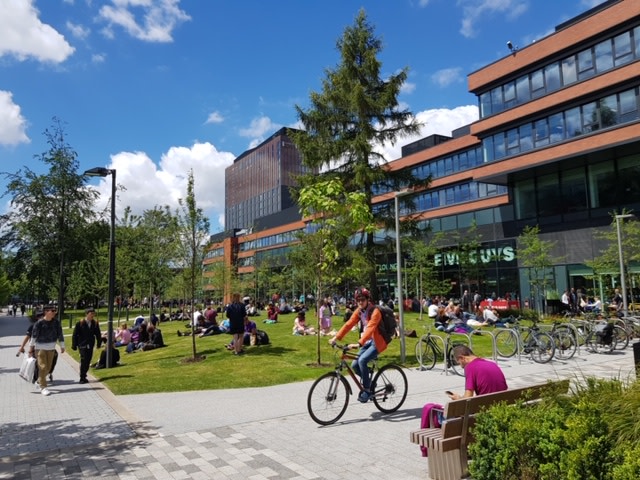World Green Building Week 2021: 5 Handy Hints for a Sustainable Workplace
By Bruntwood

20th-24th September 2021 marks World Green Building Week — a global annual campaign which champions the delivery of greener solutions to the built environment.
Having made a pledge to reach net zero carbon by 2030, being green is something we’re hugely passionate about at Bruntwood. Recently, Bruntwood SciTech was awarded an extra £95 million in development funding as a direct result of our commitment to a sustainable approach in expanding our innovation clusters. (You can read more about this here).
We believe that working towards a carbon-free built environment will mean less impact on our ecosystems, mitigating climate change and avoiding the exhaustion of natural resources. This in turn helps to address issues of climate justice and the widespread social implications of unsustainable approaches to building and the sourcing of energy. As a result, communities begin to see economic benefits, as green jobs emerge alongside the regeneration of natural systems, producing a circular economy which is sustainable in the long term.
Since ‘creating thriving cities’ is the driving philosophy behind everything we do, sustainability is — and always will be — one of our key priorities.
But at the same time, we know that many of these issues are global problems that require systemic change. Often this can’t happen without changes at an individual level. Yet to contribute to a greener world can often feel like an insurmountable task, no matter how passionate you feel.
Why the office matters
Despite the challenges of the COVID-19 pandemic leading to a significant increase in remote working, the need for people to connect and collaborate means that offices are still the main workplaces globally. It stands to reason then, that the physical working environment is a key element when considering climate change and, as most of us spend at least 8 hours a day in our offices, there are no doubt things we can all do to contribute to a more sustainable future.
We’ve provided a few hints and tips below to get you started…
Refuse — Only buy and use what you really need to do your work. It might be hard at first, but restricting yourself to using only the items which are completely necessary will help to reduce your carbon footprint (and probably also make things a bit tidier).
Reduce — A major way to become more environmentally friendly is to reduce the amount of paper your business uses. It’s incredibly easy to create a paperless workplace as almost everything can now be done digitally. Going paperless will have a huge impact on the environment, help you to save on paper and printing costs, and create simpler storage systems. If you really do have to print something out, do it double-sided to cut down on the paper used. And why not have a spring (or autumn) clean? Then try and pass on anything you get an urge to throw away, or recycle it where possible.
Reuse — Reusing items where you can has a significant impact on your waste output. For example, discarded packaging can often be reused for storage. Or if you have some paper that’s only been printed on one side, why not use the other for making meeting notes rather than wasting a new sheet?
Repurpose — A key element of our business model has always been choosing to repurpose buildings where possible, rather than knocking them down and starting from scratch. A building might look tired on the surface, but this doesn’t mean it needs rebuilding; after all, it’s what’s on the inside that counts!
This is something Bruntwood has always done because we feel it makes perfect business and environmental sense. Through this process, not only are we able to save embodied carbon, but also time, labour, product and cost.
Recycle — Recycling seems so commonplace now but it can often be overlooked. When you’re busy rushing from one meeting to the next, mindlessly throwing things away is easily done.
Often, people just need a bit of extra education around what can and can’t be recycled and why it’s important. From awareness days to creating educational resources, providing engaging information that appeals to your colleagues’ beliefs and habits can help people to see the importance of recycling and its impact on the environment. Even something as simple as making sure your recycling facilities are clearly labelled can go a long way to making sure less of your waste is going to landfill.
On your bike…
Of course, one final suggestion — and one we make to all of our colleagues — is to use more eco-friendly forms of transport when commuting, ensuring they’re being green before they’ve even reached their desks. This could be hopping on a bike and cycling in (which also has its own health benefits) or choosing public transport over using the car.
As a business, we’re committed to using our civic, public and private sector partnerships to champion eco-consciousness at city level for long term change.
But we all have the ability to make a difference to our environment and impact our world for the better; even the smallest changes will play an important role in driving improvements for a greener future.